- Home
- David Levithan
Sam and Ilsa's Last Hurrah Page 11
Sam and Ilsa's Last Hurrah Read online
Page 11
I see the error in this logic now.
I’ve always had a good life. But maybe it’s not entirely a good life if I constantly feel like one wrong move, one wrong choice can destroy it. A good life should be able to withstand more than that.
But—
But—
But what am I saying?
What am I telling myself?
I go back out into the living room. I straighten the pillows on the couch. I refold a blanket KK knocked over to sit down on the chair. Things are almost back to the way they were.
The easy thing would be to smash bottles, to break lamps. To yell FUCK IT to the world and create some damage. But I’ve tried that. I’ve tried breaking things to feel better—and found that it only feels better while things are breaking, not the next moment, when they’re broken. It’s a release that leads to nowhere. It’s not the answer.
Neither is taking it out on my own body. I learned that, too.
But maybe a clean room isn’t the answer, either.
The music across the hall gets louder. There’s talking, but I can’t hear the words. I could just collapse on the couch. I could head back to my non-room at my parents’ house. On the surface level, I’m exhausted. Spent. But there’s also a tug inside urging me to see this through. To find the way out, whatever it is.
I tell myself: I’m tired…but I still have things I need to do.
I tell myself: I’m sad…but I still have things I need to do.
I look around the apartment—everything is in order. I put fresh napkins and forks out on the dining room table. I make sure the sugar bowl and the artificial sweeteners are represented. I make sure the coffee has brewed. I move it onto a cart that Czarina has designated to be used for the coffee service.
It’s all set. And then I think of one more thing. One more touch. Another factor for the grand finale.
Delicately, I take Czarina’s champagne flutes from the glass shelf on which they usually perch. Each flute is as thin as paper and as clear as air. I cannot hold one without feeling nervous—and that’s precisely why I am taking them down now.
If there’s no way to stop being nervous, I have to learn to be okay with being nervous.
I’m still careful—each flute gets its own passage. When I’m done, they make it look like a chandelier has been spread across the table.
It feels right, and I take some satisfaction from that.
Part of me wants to leave it like this. Without anyone else around, symmetry can be achieved. Under these conditions, nervousness can dissipate. It can be just me and my well-dressed table. Me and my—
Me inside my—
Fortress.
No, I tell myself.
Look for the door.
Find it unlocked.
I step across the hall, and enter Mr. Bergman’s apartment. In the dim light, I can see Parker and Ilsa tangled in a tango. Li is knitting, but her eyes are decidedly on the dance. KK is going through Mr. Bergman’s drawers. Frederyk and Caspian are thumbing through a book of Fran Lebowitz essays that Mr. Bergman left behind. Johan is the only one who turns to me when I come in. He smiles, shifts in his seat. Making room.
“There’s coffee and petit fours and champagne for a toast,” I announce. “If anyone is interested, please return to our table. The corks will be popped in five minutes.”
I turn around and leave before I can get any response. I head straight back to Czarina’s, and her kitchen.
For about a minute, the music goes on next door, but then it stops. I hear them all come back. Most head straight to the dining room. I try not to worry about the champagne flutes as they take their seats.
“Do you need any help?” Parker pops his head in and asks.
“I need so much help,” I answer, smiling.
He comes all the way in.
“Sorry we absconded,” he says. “I was going to get you, but figured you and Jason might be stuck somewhere in the past. How’d it go?”
“The past has been relinquished. The future is being reached for.”
Parker raises an eyebrow. “That so?”
I nod.
“You up to something?”
“Yes, but I’m not entirely sure what it is yet,” I tell him. “How about you? You and Ilsa dance partners again?”
He laughs. “I think we’re good to tango, but not sure I’d say we’re gonna be partners again. To quote a late great, I wanna dance with somebody who loves me. And I have a sense that I’m not her baby tonight. Which is as it should be, I think. Best-case scenario is that it’s less of a mess than it was before—and that’s what you were going for, right?”
“I guess?”
Parker offers me a level glance. “Look, when it all comes down to it, I think you took the breakup worse than I did. Maybe worse than Ilsa did. I don’t know. I’m not saying it was the cause of you being so low, but it definitely happened during your blue period. And because me and your sister were so busy hating each other, I think that—I guess what I’m trying to say is that maybe she and I could have helped you more if we’d teamed up for it. She and I apart didn’t help you at all. And I know we never talk about it, and I’m not saying we have to talk about it right now—but being back here and all, it makes me think about that.”
“My blue period,” I say. I’ve never heard anyone refer to it like this before. It’s not something we ever talk about.
“Yeah.”
I can’t get off of it. I need to know more. I ask, “What do you know about my blue period?”
Parker’s proceeding with caution, but still, he’s proceeding. “I think both Ilsa and I know more than you think we know, Sam. But we never knew how to bring it up. We knew you hurt yourself, but…we were taking your lead when it came to talking about it. We thought if you were keeping something a secret, it wasn’t our right to force it out of you. At first, I figured you were talking to her about it, and I’d guess she thought you were talking to me about it. Since we weren’t talking to each other, it wasn’t like we could compare notes. Although now I wish we’d gotten over our bullshit to at least check in. We kinda fell down on the job, didn’t we?”
It’s like suddenly I have to rewrite the past year of my life. I thought Czarina was the only person who knew. She was the one who took me to get help. She was the one who lied and said we’d gone on a spontaneous jaunt to London—with some spontaneous Manhattan “shopping trips” away from the apartment after that.
I genuinely thought everyone had believed that.
Especially Ilsa.
A chant springs up from the dining room: “CHAMPAGNE! CHAM-PAGNE! CHAM-PAGNE!”
“I need to get out of here,” I tell my best friend, who doesn’t really know me as much as I should have let him.
“If you need to bolt, I can bring in the bottles,” he volunteers.
I shake my head. “No, not right this moment. But soon. I need to find somewhere else to be. To live.”
There’s that smile again. “Well, that’s easy,” he says. “Come to California with me.”
“Yeah, I’m sure Stanford allows people to apply in June.”
“CHAM-PAGNE! CHAM-PAGNE!” (I think Ilsa’s voice is loudest of all. Or maybe that’s KK’s.)
“COMING!” Parker hollers.
I go to the refrigerator and take out two bottles of champagne—Czarina always has four waiting for impromptu celebrations and/or consolations. I know she’ll notice them missing. I’ll just have to explain. I think she’ll understand.
“I’m serious about California,” Parker says, grabbing the bottles so I can push the coffee cart.
“I know you are,” I say. That’s all I’ll commit to.
We head into the dining room. Parker lets me go first, so he can have my back. As soon as we get there, KK yells, “Finally!”
I disregard her—something I’ve trained myself to do over years of practice. Instead, I look at Ilsa. She seems a little bit curious and a little bit confused—she knows champagne was
never part of this party’s plan.
“Coffee, anyone?” I ask.
“Do you have decaf?” Caspian inquires.
“Decaf makes no sense!” Ilsa and I answer at the same time.
“They never have decaf,” Parker adds.
“Champagne first,” KK decrees.
“It’s not your party,” I tell her.
“Come on, brother,” Ilsa chimes in. “First, toast. Then, caffeine and sweets.”
“CHAM-PAGNE! CHAM-PAGNE!” Caspian starts to chant again. No one else joins him, and the sock looks down, dejected.
I check out the faces at the table. I think they all want champagne.
I decide to be a gracious host.
“Champagne it is, then,” I say. “Who wants to do the honors?”
It can’t be me, because I am always startled by the pop. It can’t be Ilsa, because she sucks at opening anything involving a cork.
“I can,” Johan volunteers.
I watch as he effortlessly opens the first bottle and pours champagne into each of our glasses. I like him even more when he spills a little when he gets to KK, and looks momentarily horrified.
Watching him, part of me thinks, Aw, c’mon, Sam. Stay.
But then I hear Czarina, of all people, counter this, and tell me it’s not worth staying in place for someone else. I’ve seen it with her—I think she would have been off in Paris years ago, if it weren’t for me—for us. When she told me she was going to move there—“a secret, just between us,” she said—she didn’t have to point out that she’d been waiting for me and Ilsa to head off to college. I knew. In the same way she must have known that I appreciated it, even if I didn’t say anything, and even if I wasn’t planning on leaving the city for college.
She wouldn’t push me out of the nest. But she would take the nest away. And if I ended up building another nest nearby, so be it.
But—
Well, I’m not sure I want to build that nest anymore.
Because I’m not sure I should anymore.
“Are you going to make a toast?” Ilsa asks. She gestures to everyone’s glasses, ready to be raised.
“Yes,” I say, taking a deep breath. Not avoiding the nervous—plunging right into it. I lift my glass, and everyone else echoes the movement.
“Here’s to leaving!” I say.
“To leaving!” most everyone else calls out.
But not Ilsa.
What are you doing? the look in her eyes asks me.
She doesn’t understand.
Even though most everyone is already drinking, I raise my glass again to clarify.
“And not just to leaving this apartment—to leaving New York. To leaving the fortress. To exiting the comfort zone and finding the world.”
I drink up. Parker moves to clap at that, forgetting he has a champagne flute in his hand. Johan looks curious. KK looks doubtful. Frederyk looks blank, but Caspian looks encouraging, as does Li.
Ilsa still hasn’t taken a sip.
“What are you talking about?” she asks, putting her glass down.
“Maybe I’ll go to California,” I say.
KK pipes up. “What do you mean, California? Like it’s all the same. Northern California and Southern California are two different things. If you’re not going to L.A., that’s like saying you’re moving to New York when you’re really moving to Rochester.”
“When did you decide this?” Ilsa asks.
“Two minutes ago?” I answer.
Be happy for me, I want to tell her. Just let me do this.
“So this is, like, an impulse. It’s not actually a plan,” she says.
“I think it sounds like a great idea!” Johan proclaims. And I’m ridiculous, because while I appreciate his support, I also don’t want him to be quite so enthusiastic about me moving away from the city in which he lives.
“I like Northern California more than Southern California,” Caspian volunteers.
“Me too,” Li says.
“Well, of course you do—you’re New Yorkers,” KK groans, with no shortage of exasperation.
“And you’re not?” Parker asks her.
“I’m just biding my time here,” KK replies.
“Nobody’s going to California,” Ilsa insists.
“Actually, I definitely am,” Parker points out.
“You don’t count.”
Parker raises his hands in surrender. “Noted. But, hey, this isn’t about me.”
Ilsa decides to shoot even though his hands are up. “You sure you didn’t have anything to do with this? You sure you’re not the cause of this delusion?”
“Whoa!” Parker says. “Way to be supportive of your brother.”
“My brother isn’t going anywhere! We all know that.”
“I don’t know that,” Johan says.
“Me neither,” Caspian adds.
“You two don’t know anything,” Ilsa says.
“Way to tell them, bitch.” KK applauds.
“Ilsa—” Li starts.
“How about me?” I interrupt. “Don’t I know?”
“Fine,” Ilsa says. Then she raises her glass. “But first I think it’s my turn to make a toast.”
fifteen
ILSA
I want to give a toast, but I’m afraid.
Sam took out Czarina’s collection of nineteenth-century Baccarat champagne flutes. The ones she keeps on the highest shelf so they may be seen through the cabinet window but never touched (except on Czarina’s birthday and the leap days), the gold-rimmed crystal goblets of great historical family importance. They were brought to America by Czarina’s great-grandmother and her sister, who hid them under their skirts while escaping some early twentieth-century Eastern European pogrom. The glasses are Czarina’s most prized possession.
The legend of the libation chalices is a lie, of course. It’s not actually possible to hide eight crystal champagne glasses tucked into two skirt linings and climb a mountain pass to freedom without breaking the glasses or dying from the stress and exhaustion of trying to keep the glasses silent to soldiers’ ears.
I’m sure my ancestors had amazing skill. I’m just saying there are holes in the story. And that Czarina watched The Sound of Music too many times after inheriting the flutes from her own grandmother. Fact and fiction have always been blurry for Czarina, which is one of the many qualities I appreciate about her.
Her notorious temper, however—I’m terrified as hell of that. I don’t mind being on the receiving end of her lower-scale expressions of irritation, like when she finds out her booze supply has been depleted or her precious Persian carpet has a new, dark booze stain. I can even deal with her medium-scale fury when she learns that Sam broke out her best champagne, the authentic and very pricey French kind that Czarina doles out on her birthdays ending in 0 or 5, and on occasional New Year’s Days for her New Year’s Eve “hair of the dog” hangover cure. But I cannot, and will not, be on the receiving end of Czarina’s nuclear tantrum if any of the drunks at this dinner party table breaks one of her precious champagne flutes.
I’ve had eighteen years of taking the blame whenever Sam and/or my hijinks caused trouble, but this infraction—should it happen—I absolutely will not be responsible for. If something happens to one of these glasses, it’s on Sam.
Who bloody thinks he’s moving to California!
Holding the sacred goblet intimidates me so much that my hand shakes as I raise it in toast. But the loose grip puts it in mortal danger, so I tighten my hand and say, “To Sam’s wishful destination, the Sunshine State!” I’m too busy worrying about the flute; I have no idea how to finish off this toast.
Before I can continue, Caspian says, “If you mean California, that’s the Golden State.”
Little bitch.
“The Golden State!” I continue. “Land of drought, traffic, smog—”
“Those are more SoCal problems,” KK interrupts. “I think Sam sees himself farther north.” She laughs. “You’ll hate it
there, Sam,” she says to him. “It’s so not you.”
Sam says, “Coming from you, KK, I’ll take that as Northern California’s most ringing endorsement yet.”
Li says, “I don’t know why the Bay Area is referred to as Northern California. It’s more in the middle. If you look at a map.”
Johan says, “That’s true! I’ve gone hiking up in the Siskiyous. True Northern California is a whole other world from the Bay Area. May as well be another country.”
Parker begins to sing, “I left my heart in San Fran—”
“Can I finish, please?” I ask. So much rudeness. Everyone’s glasses are still raised to toast. Let a toaster finish her damn toast already.
The interrupters around the table hush. Shit, with their raised glasses and expectant expressions turned in my direction, it’s like they think I am going to say something profound. (Those are the toasts by Sam, not for him!) I say, “To Sam! Who hates too many sunny days—”
“Again, that’s Southern California you’re thinking of,” says KK. I might kill her.
“It never rains in Southern California,” Parker sings.
“Let Ilsa finish her toast already,” says Li. “My arm hurts.”
“And I’m thirsty for champers,” says Caspian.
I take a breath and try again. “To Sam, who can’t survive ten whole days off the island of Manhattan—”
This time it’s Sam interrupting me. “That was seven years ago, and I broke my leg! I couldn’t stay at Camp Ticonderoga!”
He totally could have. He left me there, alone, for five additional days of mosquito bites, basketmaking, and preadolescent lesbian crushes on camp counselors.
I ignore him. “To Sam, with dreams of California, but who breaks out in hives if he’s outside a twenty-block radius of Lincoln Center.”
“Cheers?” says Li, and takes a drink.
“Cheers,” the others add on, except for Sam. They all take a drink. Sam’s eyes narrow at me, and then he takes a drink. As do I.
“Quality champers!” exclaims Caspian.

 The Lover's Dictionary
The Lover's Dictionary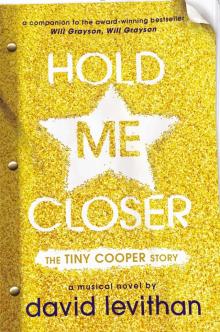 Hold Me Closer: The Tiny Cooper Story
Hold Me Closer: The Tiny Cooper Story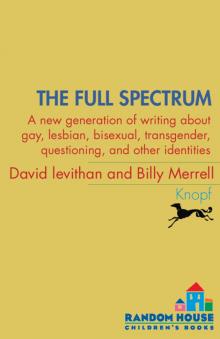 The Full Spectrum
The Full Spectrum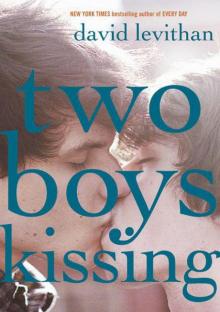 Two Boys Kissing
Two Boys Kissing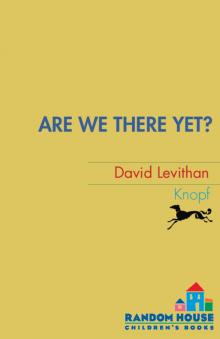 Are We There Yet?
Are We There Yet?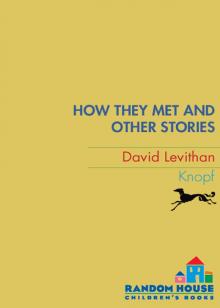 How They Met and Other Stories
How They Met and Other Stories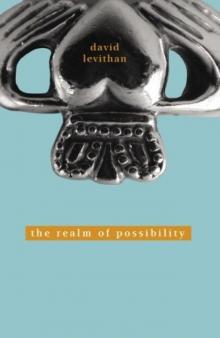 The Realm of Possibility
The Realm of Possibility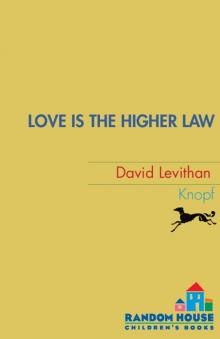 Love Is the Higher Law
Love Is the Higher Law 19 Love Songs
19 Love Songs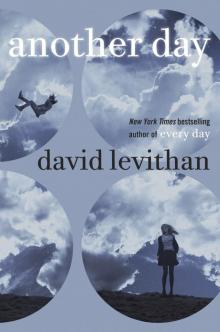 Another Day
Another Day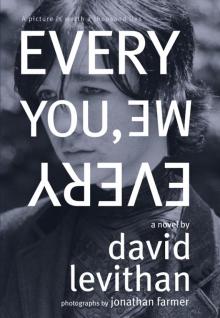 Every You, Every Me
Every You, Every Me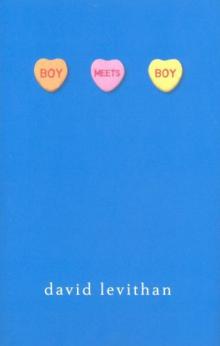 Boy Meets Boy
Boy Meets Boy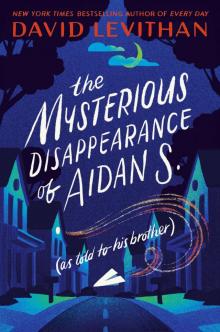 The Mysterious Disappearance of Aidan S. (as told to his brother)
The Mysterious Disappearance of Aidan S. (as told to his brother) 21 Proms
21 Proms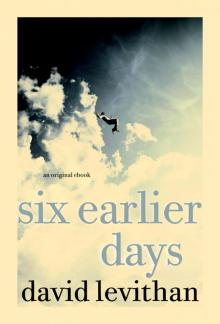 Six Earlier Days
Six Earlier Days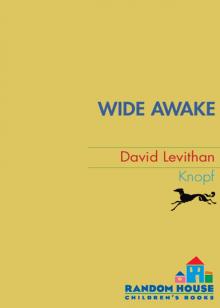 Wide Awake
Wide Awake Take Me With You When You Go
Take Me With You When You Go Someday
Someday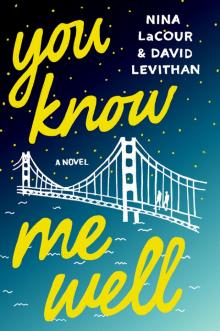 You Know Me Well
You Know Me Well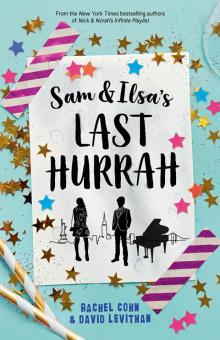 Sam and Ilsa's Last Hurrah
Sam and Ilsa's Last Hurrah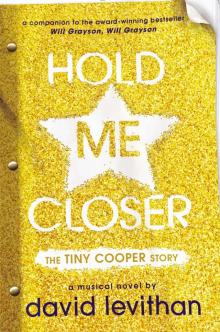 Hold Me Closer
Hold Me Closer Likely Story!
Likely Story!